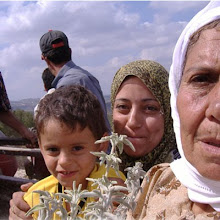Emotions in Jayyous are extreme and rapidly move from one extreme to the other. Yesterday was a case in point.
Our team of 4 was having our weekly Sunday evening team meeting—writing reports for last week, sorting out priorities, and agreeing activities for next week. Suddenly there was a noise of fireworks, and cars blowing horns and driving up and down the street outside. A young man had been released after 8 years in an Israeli prison. We had realised very quickly that it's quite impossible to plan anything here, so, dropping the admin, we joined other people walking towards the village centre under the street lamps and visited the home of the celebrating family. I went upstairs to join the men—father, uncles, cousins and friends—in a smallish room and was made very welcome with a coffee and smiles all round. One uncle spoke good English. It appears that the young man had been arrested for demonstrating and stone throwing at Israeli jeeps, the most common cause of arrest by the Israeli army. The family had been told a few days ago that he would be released. Men and boys came and went. After 15 minutes or so, it seemed appropriate not to intrude further on such a happy family occasion, so I also said my goodbyes and left. My colleagues Ewa, Inger and Florence were sitting downstairs in the small garden under the lights surrounded by small children and happy women and stayed on longer. Then we resumed the admin.
On the way back to our house I called in on a shopkeeper, a very nice man who had invited us to his house to meet his wife and children a few evenings ago. His news was very different. Both his eldest son and his brother's eldest son—both teenagers—were arrested in the middle of the night on 2 February, one of a group of 5 young men arrested from the same extended family. The accusation was the same—stone-throwing. A judge had been due to give sentence yesterday so both men went to the prison. For the seventh time judgement was postponed, until 24th May for our friend's son and until 2nd May for his brother's, perhaps because he had hired a private Israeli lawyer at substantial cost. The possibility in either case is a 4 or 5 year prison sentence. Our friend was allowed to talk to his son, but only across a large room. Visiting is not easy: a permit from the Israelis is of course needed. The prison is in Megido in the Galilee north of the West Bank, and expensive to get to. The expense of having a son in jail is also high. Food and items such are cigarettes and soap have to be provided by the family, and the prices charged are much higher than they would be if bought from our friend's shop. He explained that he felt totally powerless, unable as a father to do anything to help his son. He himself has heart problems and really needs treatment which he can't afford. Hiring expensive lawyers is for him out of the question. "This is our life", he says. What is there that can be said except express support and sympathy.
Further light was thrown on prison life when a few days earlier we interviewed a young man of 19 on the very pleasant veranda of his family home. He had been released from prison a few days before. He was arrested 7 months earlier just after midnight, interrogated in the family guest room, then, with his arms handcuffed and his eyes blindfolded, taken by jeep for further interrogation and imprisonment. He had been taken to court (a military one) 7 times, and said he was never told what he was accused of but suspects it was for taking part in the numerous demonstrations held in this area. Three other young men were also arrested that night. The others have not been released.
He described prison life as very boring and hard: roll calls at 5am, poor food, visits only from his younger brother—his parents could not get permits, some books, and endless TV. The guards could be brutal. Some younger prisoners can get access to school books to continue their studies but he could not—he will resume school now he's out. He found the whole experience frightening and intimidating—who wouldn't?—and is not likely to demonstrate again. So the Israeli army has achieved its presumed objective.
One result of his imprisonment is that his father, who had a permit to work in Israel, has now lost it and no one in the family—he has 5 brothers—will ever get one. The reason is that members of the family are now terrorism risks because they might feel like taking revenge for this young man's imprisonment. The logic is impeccable, but what happened to Judaism's values of justice and mercy here?
As I hear more and more of these stories, it seems to me more and more that this Israeli occupation is not only oppressive and violent but vindictive and vengeful. I mean by this that in their treatment of the Palestinians, the Israeli army seems determined to grind everyone down with one small injustice and humiliation after another, however petty. Perhaps I was naïve to expect an occupation to do anything else.
I have read estimates which plausibly suggest that over the years since 1967, half of the Palestinian male population has been imprisoned at one time or another.
Mike Barnes
12 April 2010

No comments:
Post a Comment